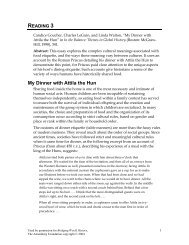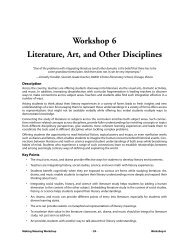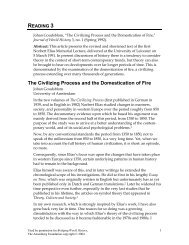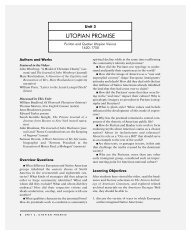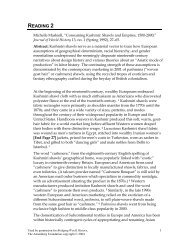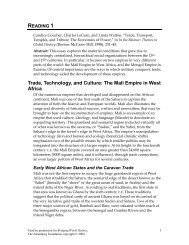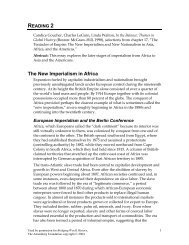Download Unit 8 Readings, Bureaucracy: A Controversial Necessity
Download Unit 8 Readings, Bureaucracy: A Controversial Necessity
Download Unit 8 Readings, Bureaucracy: A Controversial Necessity
Create successful ePaper yourself
Turn your PDF publications into a flip-book with our unique Google optimized e-Paper software.
Myers v. U.S.<br />
In an 1876 act in which Congress specified terms and appointment conditions for postmasters, Congress set a fouryear<br />
term of office for postmasters and declared that first-, second-, and third-class postmasters were to be<br />
appointed and removed by the President with Senatorial consent. When the Postmaster General removed Myers<br />
from a first-class postmastership in Portland, Oregon in 1917 with order of the President but without the approval<br />
of the Senate, Myers eventually sued to recover his lost salary.<br />
U.S. Supreme Court: MYERS v. UNITED STATES, 272 U.S. 52 (1926) 272 U.S. 52<br />
No. 2; Reargued April 13, 14, 1925; Decided Oct. 25, 1926.<br />
[272 U.S. 52, 60] Messrs. Will R. King, of Portland, Or., and L. H. Cake, of Washington, D. C. (Martin L. Pipes, of Portland,<br />
Or., of counsel), for appellant.<br />
Mr. George Wharton Pepper, of Philadelphia, Pa., amicus curiae.<br />
Mr. James M. Beck, Sol. Gen., of New York City, and Rebert P. Reeder, Sp. Asst. Atty. Gen., for the <strong>Unit</strong>ed States.<br />
[272 U.S. 52, 106]<br />
Mr. Chief Justice TAFT delivered the opinion of the Court.<br />
This case presents the question whether under the Constitution the President has the exclusive power of<br />
removing executive officers of the <strong>Unit</strong>ed States whom he has appointed by and with the advice and consent of<br />
the Senate.<br />
Myers, appellant’s intestate, was on July 21, 1917, appointed by the President, by and with the advice and consent<br />
of the Senate, to be a postmaster of the first class at Portland, Or., for a term of four years. On January 20, 1920,<br />
Myers’ resignation was demanded. He refused the demand. On February 2, 1920, he was removed from office by<br />
order of the Postmaster General, acting by direction of the President. February 10th, Myers sent a petition to the<br />
President and another to the Senate committee on post offices, asking to be heard, if any charges were filed. He<br />
protested to the department against his removal, and continued to do so until the end of his term. He pursued no<br />
other occupation and drew compensation for no other service during the interval. On April 21, 1921, he brought<br />
this suit in the Court of Claims for his salary from the date of his removal, which, as claimed by supplemental petition<br />
filed after July 21, 1921, the end of his term, amounted to $8,838.71. In August, 1920, the President made a<br />
recess appointment of one Jones, who took office September 19, 1920. [272 U.S. 52, 107] The Court of Claims gave<br />
judgment against Myers and this is an appeal from that judgment. The court held that he had lost his right of<br />
action because of his delay in suing, citing Arant v. Lane, 249 U.S. 367, 39 S. Ct. 293; Nicholas v. <strong>Unit</strong>ed States, 257<br />
U.S. 71, 42 S. Ct. 7, and Norris v. <strong>Unit</strong>ed States, 257 U.S. 77, 42 S. Ct. 9. These cases show that when a <strong>Unit</strong>ed States<br />
officer is dismissed, whether in disregard of the law or from mistake as to the facts of his case, he must promptly<br />
take effective action to assert his rights. But we do not find that Myers failed in this regard. He was constant in his<br />
efforts at reinstatement. A hearing before the Senate committee could not be had till the notice of his removal<br />
was sent to the Senate or his successor was nominated. From the time of his removal until the end of his term,<br />
there were three sessions of the Senate without such notice or nomination. He put off bringing his suit until the<br />
expiration of the Sixty-Sixth Congress, March 4, 1921. After that, and three months before his term expired, he<br />
filed his petition. Under these circumstances, we think his suit was not too late. Indeed the Solicitor General, while<br />
not formally confessing error in this respect, conceded at the bar that no laches had been shown.<br />
By the sixth section of the Act of Congress of July 12, 1876, 19 Stat. 80, 81, c. 179 (Comp. St. 7190), under which<br />
Myers was appointed with the advice and consent of the Senate as a first-class postmaster, it is provided that:<br />
‘Postmasters of the first, second, and third classes shall be appointed and may be removed by the President by<br />
and with the advice and consent of the Senate, and shall hold their offices for four years unless sooner removed<br />
or suspended according to law.’<br />
The Senate did not consent to the President’s removal of Myers during his term. If this statute in its requirement<br />
that his term should be four years unless sooner removed by the President by and with the consent of the [272<br />
U.S. 52, 108] Senate is valid, the appellant, Myers’ administratrix, is entitled to recover his unpaid salary for his full<br />
<strong>Unit</strong> 8 - 202 - Democracy in America






